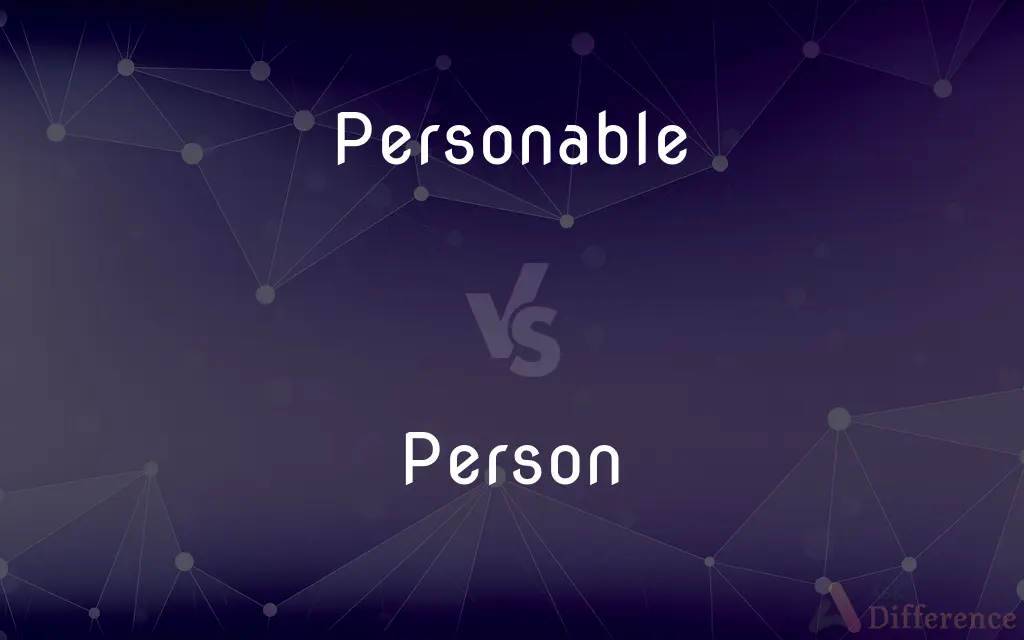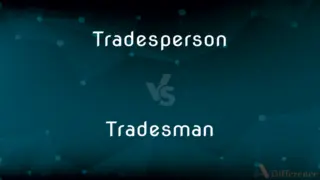Personable vs. Person — What's the Difference?

Difference Between Personable and Person
ADVERTISEMENT
Compare with Definitions
Personable
Pleasantly sociable.
Person
A person (plural people or persons) is a being that has certain capacities or attributes such as reason, morality, consciousness or self-consciousness, and being a part of a culturally established form of social relations such as kinship, ownership of property, or legal responsibility. The defining features of personhood and, consequently, what makes a person count as a person, differ widely among cultures and contexts.In addition to the question of personhood, of what makes a being count as a person to begin with, there are further questions about personal identity and self: both about what makes any particular person that particular person instead of another, and about what makes a person at one time the same person as they were or will be at another time despite any intervening changes.
Personable
Pleasing in appearance; attractive.
Person
A living human. Often used in combination
Chairperson.
Salesperson. See Usage Note at chairman.
Personable
(of a person) Having a pleasing appearance; attractive; handsome.
ADVERTISEMENT
Person
An individual of specified character
A person of importance.
Personable
(of a person) Having a pleasant or manner; friendly; amiable.
Person
The composite of characteristics that make up an individual personality; the self.
Personable
Enabled to maintain pleas in court.
Person
The living body of a human
Searched the prisoner's person.
Personable
Having a well-formed body, or person; graceful; comely; of good appearance; presentable; as, a personable man or woman.
Wise, warlike, personable, courteous, and kind.
The king, . . . so visited with sickness, was not personable.
Person
Physique and general appearance.
Personable
Enabled to maintain pleas in court.
Person
(Law) A human, corporation, organization, partnership, association, or other entity deemed or construed to be governed by a particular law.
Personable
(of persons) pleasant in appearance and personality
Person
(Christianity) Any of the three separate individualities of the Father, Son, and Holy Spirit, as distinguished from the essence of the Godhead that unites them.
Person
Any of three groups of pronoun forms with corresponding verb inflections that distinguish the speaker (first person), the individual addressed (second person), and the individual or thing spoken of (third person).
Person
Any of the different forms or inflections expressing these distinctions.
Person
A character or role, as in a play; a guise
"Well, in her person, I say I will not have you" (Shakespeare).
Person
An individual substance of a rational nature; usually a human being.
Each person is unique, both mentally and physically.
Person
A character or part, as in a play; a specific kind or manifestation of individual character, whether in real life, or in literary or dramatic representation; an assumed character.
Person
(Christianity) Any one of the three hypostases of the Holy Trinity: the Father, Son, or Holy Spirit.
Person
Any sentient or socially intelligent being.
Person
(in a compound noun or noun phrase) Someone who likes or has an affinity for (a specified thing).
Jack's always been a dog person, but I prefer cats.
Person
(in a compound noun or noun phrase) A human of unspecified gender (in terms usually constructed with man or woman).
Person
(in a compound noun or noun phrase) A worker in a specified function or specialty.
I was able to speak to a technical support person and get the problem solved.
Person
The physical body of a being seen as distinct from the mind, character, etc.
Person
(law) Any individual or formal organization with standing before the courts.
At common law a corporation or a trust is legally a person.
Person
The human genitalia; specifically, the penis.
Person
(grammar) A linguistic category used to distinguish between the speaker of an utterance and those to whom or about whom they are speaking. See grammatical person.
Person
(biology) A shoot or bud of a plant; a polyp or zooid of the compound Hydrozoa, Anthozoa, etc.; also, an individual, in the narrowest sense, among the higher animals.
Person
To represent as a person; to personify; to impersonate.
Person
To man, to supply with staff or crew.
Person
A character or part, as in a play; a specific kind or manifestation of individual character, whether in real life, or in literary or dramatic representation; an assumed character.
His first appearance upon the stage in his new person of a sycophant or juggler.
No man can long put on a person and act a part.
To bear rule, which was thy partAnd person, hadst thou known thyself aright.
How different is the same man from himself, as he sustains the person of a magistrate and that of a friend!
Person
The bodily form of a human being; body; outward appearance; as, of comely person.
A fair persone, and strong, and young of age.
If it assume my noble father's person.
Love, sweetness, goodness, in her person shined.
Person
A living, self-conscious being, as distinct from an animal or a thing; a moral agent; a human being; a man, woman, or child.
Consider what person stands for; which, I think, is a thinking, intelligent being, that has reason and reflection.
Person
A human being spoken of indefinitely; one; a man; as, any person present.
Person
A parson; the parish priest.
Person
Among Trinitarians, one of the three subdivisions of the Godhead (the Father, the Son, and the Holy Ghost); an hypostasis.
Person
One of three relations or conditions (that of speaking, that of being spoken to, and that of being spoken of) pertaining to a noun or a pronoun, and thence also to the verb of which it may be the subject.
Person
A shoot or bud of a plant; a polyp or zooid of the compound Hydrozoa Anthozoa, etc.; also, an individual, in the narrowest sense, among the higher animals.
True corms, composed of united personæ . . . usually arise by gemmation, . . . yet in sponges and corals occasionally by fusion of several originally distinct persons.
Person
To represent as a person; to personify; to impersonate.
Person
A human being;
There was too much for one person to do
Person
A person's body (usually including their clothing);
A weapon was hidden on his person
Person
A grammatical category of pronouns and verb forms;
Stop talking about yourself in the third person
Share Your Discovery

Previous Comparison
Tradesperson vs. Tradesman
Next Comparison
Micturate vs. Urinate














































